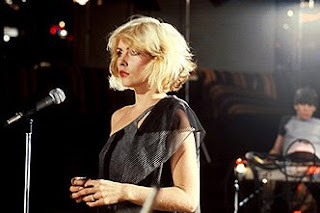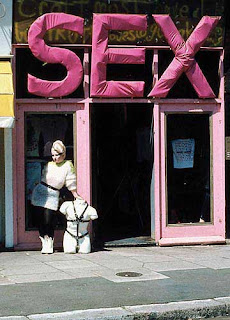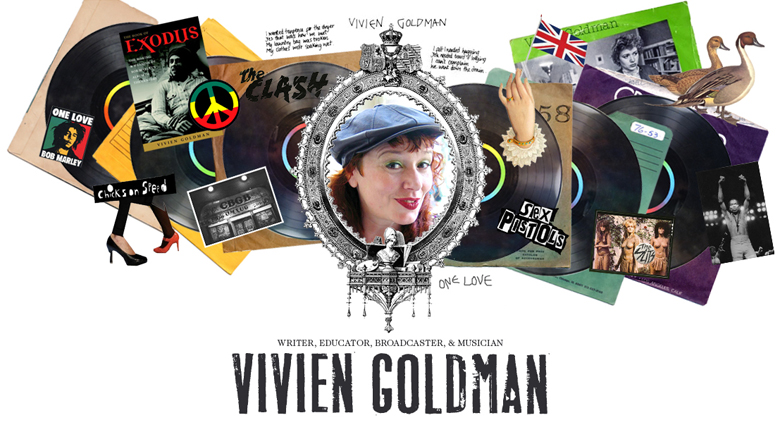READER QUESTIONS ANSWERED
This week’s session is a little different as it's more of a chat between us; call it a think tank if you like. Keep sending those questions and at regular intervals, we'll just devote a column like this to filling in those blanks, as well as the regular answer-per-column business.
1) From Lindsay Tulkoff: I love punk - I really wish I had been around back then. How come punk in the United States wasn’t as political as it was in Britain?
Thanks, Lindsay. I can tell you, those were some wild times, and though there was a lot of beating-up type of violence, guns were not involved – which I noticed in recent trips to my home town, London, is sadly not the case today. Kids killing kids has become a grisly reality. But more of that another time, and I’m curious about readers thoughts/questions on violence and punk.
There’s a school of thought that insists that EVERYTHING is political – in which case, The Ramones singing 'Sheena Is a Punk Rocker' or Blondie singing 'Denis Denis' has as much political weight as the Pistols' 'Anarchy In The UK.'. But you’re right in that UK punk was a vehicle for expression about the extremely messed-up state of Britain at that time. Unemployment was at a new high, and it seemed like the old systems had crashed completely. There were constant strikes by the unions – which Margaret Thatcher would soon de-fang, for good or ill, just as punk was segueing into post-punk. Power cuts lasted for days, garbage frequently piled high in the streets, and IRA bombs could explode anywhere, any time.




And what do you, dear punk reader, think of the other aspects of American punk? Let me know.
2) From Joyce Crowley: Where did you meet the Clash and what is Paul Simonon like?
The way it was for me was the way it can be in any low-rent, high-skills community of artists. The Clash were a local band – Joe Strummer started out playing in the Elgin pub across the road from my house in the 101’ers - and I was a music journalist. Just like in, say, the tight knit SF punk scene, or the CBGB’s crowd in NYC’s pre-gentrified Lower East Side, there were none of today’s barriers between artist, fan and media pal. The famous incident where my fellow scribe Nick Kent was punched out by the volatile Pistols' bassiist, Sid Vicious is less likely to happen now that VIP rooms isolate artists from their audiences in all but the punkier venues. Stay punk! (But skip the punch, preferably.)

What is Paul Simonon like? In many ways, Paul IS the archetypal punk, in that one of the first times he ever picked up a bass was onstage with the Clash. After being taken on by Joe Strummer and Mick Jones, it was pretty well acknowledged that though he had zero bass playing experience, he more than made up for it with his style and impressive cheekbones. Paul was really the visual artist of the band, (as well as the in-house heartthrob, -- his dramatic fling with Patti Smith, who he met when she jumped onstage with the Clash at a gig, was one of the first collaborations between Anglo-American Punk.) His early canvases, particularly one grey and brown-toned landscape of a car dump, indicated his visual taste was just as raw and punky as his first bashes at bass. He was largely responsible for Clash fashion statements like the words stenciled up the legs of his flight suit; and the paint-spattered look inspired by Jackson Pollock’s drip paintings. Now, Paul plays with the Gorillaz' Damon Albarn in The Good The Bad and the Queen, and the rest of the time, he's the fine art painter he first set out to be.

3) From Devin Farrell: Do you agree with me that the U.K. is better than the U.S.? (I live in the U.S.)
Thanks for that neat philosophical query, Devin. You may have guessed that I’ve lived and still move between both great nations, and I can tell you that ultimately, everywhere has its advantages and disadvantages. One distinction that I have observed: the English generally tend to prize eccentricity more than Americans, which partly explains why punk flourished there.
4) From Edward Arthur: 1) Whatever happened to Ed Bahlman? 2) Did PUNK really start in the UK?
If anybody reading this knows a number for Ed Bahlman, do let me know. Does Bahlman owe you money, Other Ed? Or are you simply a fan of Ed’s late 70s-early 80s label, 99, on which I was an artist along with ESG, Glenn Branca, ETC, all now regarded as musical post-punk pioneers. The spacey NJ?? Funk of all-girl trio, ESG, is now on the road again – this time, with their daughters! -- and Glenn is a busy composer. Thus the artists Ed signed are all present and correct, but – where’s Ed?


And a very interesting question from Pedro Marazzi: What is your view of modern-day punk bands?
Particularly those we in the US are subjected to. In the UK there was deemed to be three generations of punk bands. The first generation, which you seem to belong to, being Pistols, Clash etc. Generation 2 being Stiff Little Fingers, Ruts etc. Generation 3 being Anti Nowhere League, Exploited etc. Due to my age I came in at Generation 2 and initially felt like I’d already missed the party. First generation punkers tend to be too easily dismissive of most punk that followed, probably due to less originality. What is/was your view?
TUNE IN NEXT TIME FOR THE ANSWER TO PEDRO'S QUESTION -- AND ASK ME ANOTHER....
